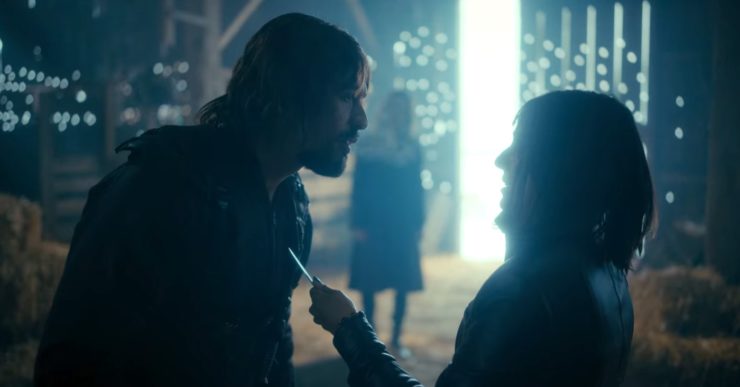If someone asked you what The Umbrella Academy was about, chances are you would use the word “family” somewhere in your description. It’s possible that you might even use the term “found family”—after all, Reginald Hargreeves’ wards were raised together, but those kindred bonds didn’t really coalesce until the end of the show’s first season. The point is, for all possible interpretations and wherever the show ends up taking its viewers, The Umbrella Academy is a show about the Hargreeves kids learning how to be family to one another.
It’s also a show about familial abuse.
[Spoilers up through the entire second season of The Umbrella Academy.]
There are plenty of stories that detail this form of abuse, but The Umbrella Academy has distinguished itself in a particular way—not only does the show work to show us an astonishing array of variance in how this abuse can be enacted, but it takes that point a step further in illustrating how this abuse perpetuates and sustains itself, where it puts down roots, and what its antidote might be.
Buy the Book
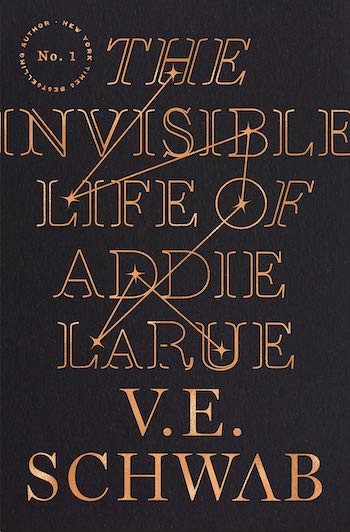

The Invisible Life of Addie LaRue
Unsurprisingly, the series begins to dissect this concept using the Hargreeves children themselves. Raised by a man who disliked children to be a super world-saving team more than a family, the Hargreeves are so ill-equipped to be emotionally available to one another that they end up spreading out and losing touch for years, only reuniting for their father’s funeral. The effect of his parenting (or lack thereof) is made clear in how disconnected each of the them are from life: Vanya has no friends or world beyond music; Diego couldn’t hack being a cop, so he’s a vigilante who sleeps in the boiler room of a boxing ring; Luther lived in total isolation on the moon for four years; Klaus has been lost in an impenetrable cloud of drugs and alcohol; Five was alone for decades after accidentally jumping forward in time to a post-apocalyptic future, then became a temporal assassin for a chance to get home to his family; Ben is literally dead, so the only person he gets any contact with is ghost-seeing Klaus (on the rare occasion that his brother is sober).
The only member of the group who managed to have semi-normal relationships is Allison… but that’s soon revealed to be a fallacy, as her life as a famous actress with a family of her own is falling apart. Allison’s particular superpower—the ability to make people do whatever she wants by prefacing the command with the words “I heard a rumor”—has resulted in a hollow career, a broken marriage, and the loss of custody over her daughter. None of the inaugural class of the Umbrella Academy knows how to be family to anyone, even when it’s clear that they desperately want to be. And this inability, fostered by their abusive father, is the reason why they utterly botch any chance they have at stopping the apocalypse that Five knows is coming; once they learn that the cause is their sister Vanya, that she had her own powers that their father hid from the world (and from her), they treat her like a danger instead of their sister.
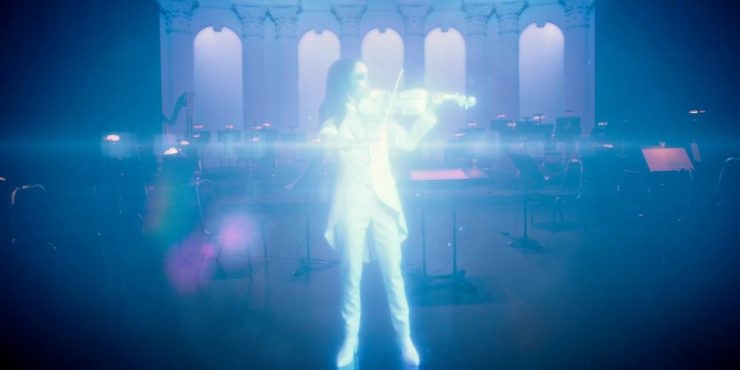
And she destroys the world, necessitating their escape into the past.
The abuse that Vanya underwent throughout their childhoods primes her for more abuse in her romantic relationship with Leonard Peabody (formerly Harold Jenkins). This is a commonality in people who are abused by close family members growing up—it makes them statistically more likely to enter into abusive relationships as adults, which is why Vanya doesn’t notice that Leonard’s obsession with her burgeoning abilities closely mirrors her father’s methods of control.
The audience is given a glimpse into Leonard’s own abusive childhood; after his mother dies in childbirth, Leonard’s father retreats into alcoholism and becomes an abusive parent who treats his son so horrifically, he is eventually murdered by the boy. Leonard is obsessed with the Umbrella Academy, born on the same day as all the Hargreeves children and desperately wishing for powers of his own. But an encounter with Reginald Hargreeves, another father figure who tears young Leonard down for his desire to belong, makes the Academy yet another family that he’s not welcome in. Leonard becomes an abuser himself in response, resulting in his death at Vanya’s hands in payback for his manipulation and cruelty.
The second season builds on this thematic overlay with the introduction of several new family units: Sissy, with her husband Greg and son Harlan; the Commission’s Handler and her “daughter” Lila; and the family of Dave Katz, the man Klaus fell in love with when he accidentally time traveled to the Vietnam War in season one. As these familial dynamics are presented alongside the growth displayed by the Hargreeves crew, the show’s perspective on family comes clear and lays a major narrative building block into place.
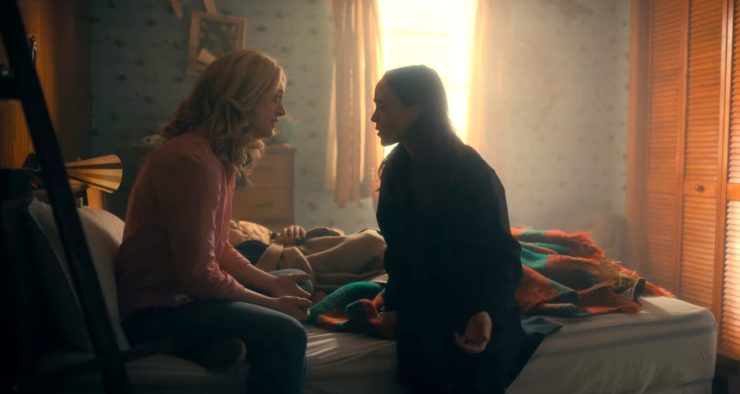
It begins with Sissy Cooper, the woman who takes in an amnesiac Vanya after hitting her with her car when she falls through Five’s time travel portal into 1963. Vanya quickly slots herself into Sissy’s family, helping to take care of Harlan, Sissy’s son who has nonverbal autism. It’s obvious that Sissy appreciates having Vanya’s help, but more than that, she appreciates having a partner in life who doesn’t ignore her. Carl Cooper, Sissy’s husband, is a salesman who prefers to stay away from home—in his introductory scene, he makes it clear how he feels about his son when he states that if Harlan ever spoke (even by mimicking his cursing), he’d buy the kid a Cadillac. Later, when Vanya goes to pick Carl up outside a strip club—after he’d claimed he was working late—Carl tells Vanya that she’s lucky not to remember her life from before she arrived. She gets to start over, have a “clean slate”, while others are stuck with the life they have.
Over the course of their time together, Vanya and Sissy fall in love. Carl finds out, and likens queerness to hoof-and-mouth disease, insisting that he’ll destroy Vanya before she can destroy his family. But the irony is that Carl doesn’t appear to have any genuine love for the people living in his house—he finds Sissy’s needs and requests irritating and doesn’t treat her as an equal. He later claims that he never “blamed” her for Harlan’s autism, thereby indicating that he absolutely does blame her for it, but believes he has been a good husband by never saying so to her face. He threatens to put Harlan in an institution to punish Sissy for not quietly obeying him. For a man who wants Vanya to believe that she’s lucky to have a fresh start in life, Carl holds on awfully hard to a family that, by all accounts, he doesn’t want or appreciate. Not only that, but he enlists other members of his family to help him do so—when Sissy tries to leave him, Carl calls in his State Trooper brother to set up a checkpoint on the road and stop her from running off with Vanya.
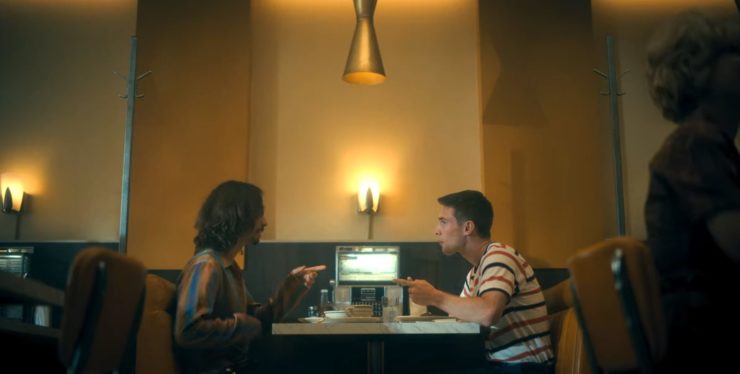
The appearance of Dave Katz in the second season, too, is something of a surprise—he’s already died in Vietnam, his romance with Klaus cut brutally short. But having been sent back several years before his tour in the war, Klaus realizes that he has a singular opportunity to save the love of his life. After first meeting a younger Dave at the paint store owned by his family, Klaus later corners him at a diner while his uncle is in the restroom to tell him that he shouldn’t join the army. Klaus also knows that a major part of Dave’s decision is wrapped up in family history; his grandfather fought in World War I, his father in World War II, his uncle in the Korean War, and Dave believes it’s his duty to his family to do the same. But while Klaus tries to convince Dave of the future he has already witnessed, the uncle comes back from the restroom and insists that his nephew teach “the queer” a lesson by hitting him. Dave finally breaks, punching Klaus in the face.
Later on, the young man comes to find Klaus at his cult headquarters, intent on getting more information and curious about why this stranger went out of his way to talk to him. Klaus tries once again to get Dave to believe him, even going so far as to show him the dogtags that he always wears, bearing Dave’s name. But the knowledge spooks Dave, who tells Klaus that it doesn’t make any difference—after their altercation in the diner, his uncle marched him over the recruitment office to sign up. Dave insists that it would be a privilege to die for his country in any case, leaving in tears. And it’s relevant to note that while family already played an important role in his decision to enlist in the initial version of this timeline, here Dave isn’t permitted to make the choice on his own, but at the behest of his uncle.
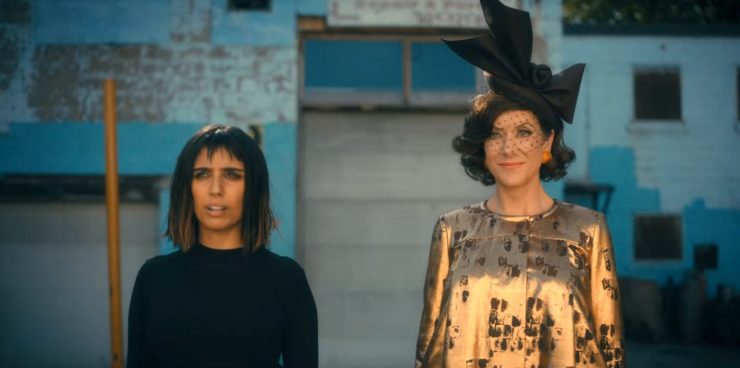
Then there’s Lila Pitts, raised by the Handler as a daughter and an assassin, who spends the majority of the season enacting her mother’s agenda to take over the Commission. It is revealed later that Five was responsible for the death of Lila’s real parents during his time as a Commission assassin, but the Handler forged documentation to take her name off the hit order because she had her own reasons for offing her soon-to-be daughter’s family—Lila was also born with superpowers. Like Reginald Hargreeves, the Handler wanted a super child to do her bidding, adding Lila to her list of assets in gaining more and more power for herself. This doesn’t all come to light until the end of the season, but it takes a heartfelt plea from Diego (who Lila has fallen in love with) to help her understand how she is being used.
Because this is the real undercurrent of The Umbrella Academy thus far. It’s not just about finding your family, but explicitly about what makes a family. And at every turn, the show tells us one thing: Family is not built on obligation—it is built on support.
This is important because amidst the very real abuse that many of these characters suffer, there is also plenty of gonzo violence and outsized trauma to deal with, even amongst its more heroic set. In such a setting, it’s easy for an audience member to ask what truly separates the protagonists from the antagonists, at least in action. Most of the people on screen are responsible for their fair share of death, destruction, and chaos. As a tonal choice, it absolutely works, but it also means that a different measurement system is required when making sense of morality. And so, doing “bad things” is not the mark by which we judge people in this universe. It is in this space between obligation and support.
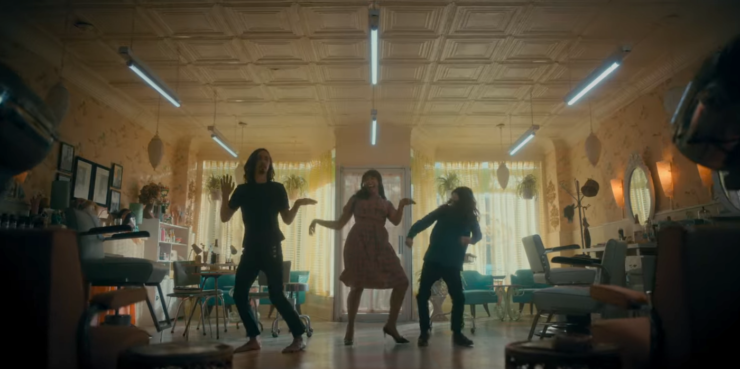
Carl Cooper considers his family a burden rather than a blessing. Dave Katz will die in Vietnam because his family insists that he should go to war. The Handler expects Lila to do as she commands because a daughter should want to please her mother. Leonard Peabody’s father stopped viewing his son as a welcome addition to his family the instant his wife died. Reginald Hargreeves doesn’t even like children, but he demands each and every one of his adoptees to behave in the manner he dictates without question or complaint. It should come as no surprise that the people who view family in this manner are abusers—in their minds, family is a function, not a living, breathing system that grows and changes as people do.
But while all these people build their families around concepts of obligation, the Hargreeves’ are slowly learning that family should mean the opposite. Where in the first season they circled each other warily, refused to hear each other’s pleas for help, and caused the apocalypse by perpetuating their father’s abuse onto their sister, the second season sees a shift in these dynamics. And in the end, when Vanya needs their help and asks for it, they may waffle at the start, but it doesn’t stop them from piling into the car to aid her.
As Diego says to Lila while his family looks on with abject fondness, “I know what it’s like to love dangerous people. Difference is, they love me back.”
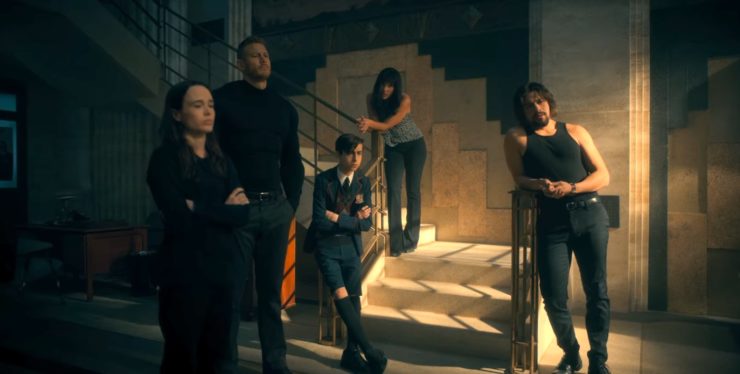
Because there’s risk inherent in all intimate relationships, but it isn’t that risk that harms family—it’s a failure to understand the difference between being obligated to someone and being supportive of them. And if the Hargreeves kids can figure out how to walk that line as the show (hopefully) continues? Then eventually, they might just become that unstoppable force that their father wanted them to be.
Emmet Asher-Perrin really hopes Netflix greenlights season three stat, because THAT ENDING. You can bug them on Twitter, and read more of their work here and elsewhere.










